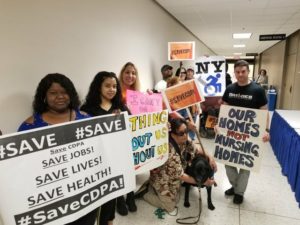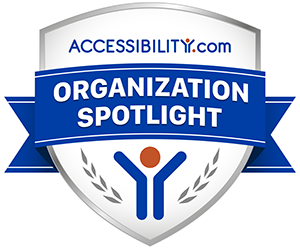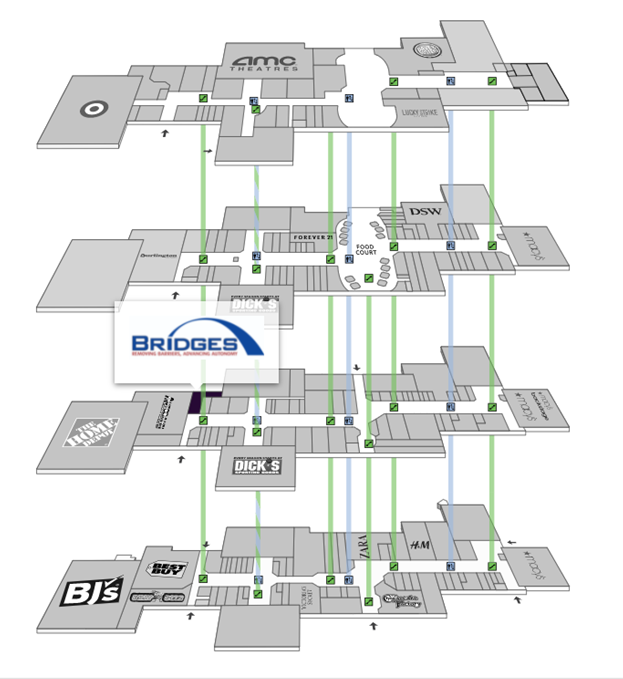
Independent living, as a philosophy, emphasizes consumer control, including directing your own care. The IL philosophy believes people with disabilities are the best experts on their own needs; have crucial and valuable perspective to contribute; and deserve equal opportunity to decide how to live, work, and take part in their communities, especially regarding services that greatly affect their day-to-day lives and access to independence.
The Independent Living movement grew out of the disability rights movement, which began in the 1960s. The first Independent Living Center was founded in 1972; over the years, ILCs have supported people with disabilities through various transitions to independence — from school to employment and from institutional to community living. ILCs believe that community includes everyone – people with disabilities and those without. All people should be able to live independently and participate fully in their communities. When people with disabilities are asked where they prefer to live, they say in their communities, not in institutions. Community living benefits not only individuals and their families, but the community itself. Communities would miss out on valuable voices and perspectives if people with disabilities were left out. Community living is also less expensive than other options for most people.
In 1999, the U.S. Supreme Court ruled in Olmstead v. L.C. that people with disabilities must receive services in the most integrated settings possible. Consumer Directed Personal Assistance programs, designed for and by people with disabilities, are aligned with that ruling. CDPA programs allow people with disabilities, who are in need of personal assistance, to hire their own Personal Assistants and direct their own care. CDPA programs give people with disabilities independence, and respect their right to direct their own care within the community.
Recent changes in New York State funding threaten not only organizations that serve as fiscal intermediaries, but over seventy thousand disabled New Yorkers who rely on fiscal intermediaries to live in the community, and over a hundred thousand New Yorkers working hard to provide CDPA services. This would be a step backwards for the disability community. We do not want to go back to a time when disabled and elderly New Yorkers who have moderate to significant support needs were forced into institutions. CDPA programs give people with disabilities the most control over their lives. They allow them to choose who enters their homes, helps with intimate tasks and touches their bodies – on a schedule that works for them, not an agency. CDPA provides the least restrictive level of care and an alternative to the traditional medical model of home health care. CDPA programs empower disabled people with more dignity by giving them the control and support needed to hire their own attendants and direct their own care.
BRIDGES CDPA Program participant, Oliver Hilario, is a person with a disability who hired his own Personal Assistant. When discussing the CDPA Program, Mr. Hilario stated “the CDPA Program is very important to me because it helps me to be more independent. I don’t have to depend on my parents to take me places. I am able to go out to places that I couldn’t go to before because my PA takes me.”
The CDPA Program is important not only to consumers, but to their personal assistants, as well. Mayelin Vasquez Valverde is a Personal Assistant for her aunt. Ms. Valverde stated that the CDPA Program “allows my aunt to stay home” instead of in an institution. The Program also allows Ms. Valverde “to work with family and focus on my aunt’s needs.” She stated “Family knows family best. We know when they like to get up and when they like to eat.” “My aunt is much more comfortable with me as far as bathing and personal hygiene, preparing meals, and giving medications.”
It is essential that CDPA Programs are able to continue helping people with disabilities to retain their independence at home, receiving the care they need from a person of their choosing. A per-member-per-month flat fee could potentially lead to mass institutionalization and the collapse of fiscal intermediaries. The per-member-per-month flat fee disincentivizes serving people with significant disabilities and undermines the disability community’s independence and freedom. Independent Living Centers are committed to serving individuals with the most complex needs and ensuring everyone who wants to live in the community can live in the community. The Supreme Court has affirmed the rights of people with disabilities to live in the community, and New York State even created an Olmstead Plan committing to de-institutionalization and community integration. CDPA programs are a vital part of any community integration plan and allow disabled people to live independently in the community with control over their own lives. As an Independent Living Center, BRIDGES will continue to promote health and autonomy for people with disabilities through its CDPA Program and other services.




